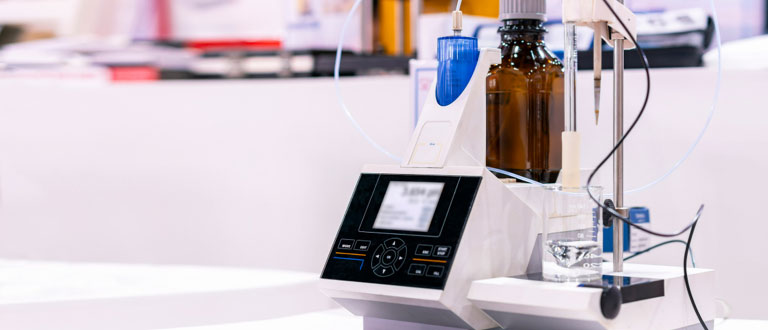Utilizing Moisture Content Testing in Food Production

Accurate determination of moisture content is critical in food production, impacting shelf life estimations, nutritional labeling (calorie and carbohydrate calculations), and overall product quality. This post explores two primary methods: the standard moisture test and the Karl Fischer Titration method, highlighting their applications and differences.
The Standard Moisture Test: A Gravimetric Approach
Our standard moisture test, a gravimetric method (also known as a loss-on-drying test), is an affordable and widely accepted (A2LA/ISO accredited) technique for determining moisture content in many food products. This method involves heating a sample in a controlled oven and measuring the weight loss due to water evaporation. The percentage weight loss represents the moisture content.
Advantages:
- Cost-effective
- Widely accepted industry standard
- Relatively simple procedure
Limitations:
- Not suitable for all food types. It's inaccurate for samples containing volatile compounds (e.g., solvents, alcohols, flavorings) that evaporate alongside water, leading to inflated moisture readings.
- The method may not be suitable for samples that "skin" during oven drying.
Karl Fischer Titration: A More Selective Method
For samples unsuitable for the standard moisture test due to volatile components or the tendency to form a skin during oven drying, the Karl Fischer Titration (KFT) method offers a more precise and selective approach. This method directly measures the water content by reacting it with a specific reagent.
How it Works:
The KFT method involves a chemical reaction where water in the sample is directly consumed by a titrant within a reaction vessel. This makes it far more selective for water than oven drying methods. The amount of titrant consumed is directly proportional to the water content. For solid samples, thorough extraction of water into a suitable solvent (often methanol) is crucial for accurate results. We typically employ overnight shaking to maximize extraction before titration.
Advantages:
- Highly selective for water; it doesn't measure other volatile compounds.
- Suitable for samples containing solvents, alcohols, and other volatile ingredients.
- Provides accurate results even for samples that are unsuitable for oven drying.
Types of Karl Fischer Titration:
While Medallion Labs primarily uses volumetric Karl Fischer Titration for food samples with higher water content, coulometric titration is another method used for samples with very low water levels (0.001% to 1%). However, due to the typically higher water content in food products, we do not offer coulometric testing.
Comparing Results: Standard Moisture Test vs. Karl Fischer Titration
Generally, when a sample is suitable for both methods, the results should be comparable. However, discrepancies can arise if the sample contains volatile compounds or is unsuitable for oven drying. The variability of results depends on the sample matrix.
Sample Submission for Karl Fischer Titration
A detailed sample description is crucial for accurate KFT results. Please specify any components that might interfere with the test, such as:
- Antioxidants
- Reducing agents
- Strong acids
- Strong bases
Special handling may be required for certain samples, including:
- Dried fruits
- Fruit leathers
- Some specialty carbohydrates
Acceptable sample matrices for KFT include (but are not limited to):
- Alcohol
- Butter
- Extracts
- Ethanol
- Fats
- Fish feed
- Flavorings
- Enhancers
- Glycerin
- Liqueur
- Margarine
- Mayonnaise
- Mineral oil
- Mouthwash
- Niacinamide
- Oils
- Pet food
- Propylene glycol
- Raisins with glycerin
- Shortening
- Solvents
- Sterols
Karl Fischer Titration Moisture Test
See the technical data sheet for the Karl Fischer Titration Moisture test.
View TestAdditional Water-Related Tests
Beyond moisture content, Medallion Labs offers other relevant tests:
- Water Holding Capacity: This test, applicable to grain-based products, measures the ability of a powder to retain water. It's often performed alongside moisture testing and used in result calculations. The solvent used can vary depending on the application (water, aqueous solutions of salts, weak acids, or weak bases).
- Water Activity: Unlike moisture content, water activity measures the availability of water for microbial growth. A low water activity, even with relatively high moisture content (e.g., dry pasta), inhibits microbial growth.
Choosing the Right Test for Your Needs
Medallion Labs offers a range of moisture testing options to meet diverse needs. Contact us at 1-800-245-5615 or visit our website to discuss your specific requirements and choose the most appropriate and cost-effective testing method. Our technical data sheets and online order form provide the latest details. We are committed to providing accurate, reliable, and actionable results to support your food production operations.
Let's Get to Work!
Submit your order online and ship your samples today. If you have questions, we are always here to help.
Medallion Labs+
A food testing program designed with mid-market and enterprise food and ingredient manufacturers in mind.